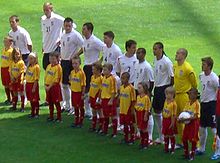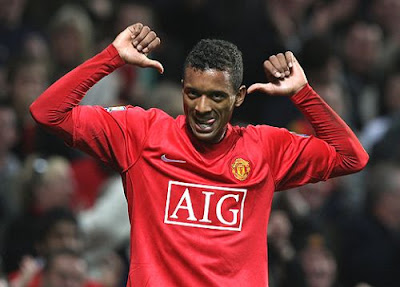The England national football team is the joint oldest in the world; it was formed at the same time as Scotland. A representative match between England and Scotland was played on 5 March 1870, having been organised by the Football Association. A return fixture was organised by representatives of Scottish football teams on 30 November 1872. This match, played at Hamilton Crescent in Scotland, is viewed as the first official international football match because the two teams were independently selected and operated, rather than being the work of a single football association.[2] Over the next forty years, England played exclusively with the other three Home Nations—Scotland, Wales and Ireland—in the British Home Championship.
To begin with, England had no permanent home stadium. They joined FIFA in 1906 and played their first ever games against countries other than the Home Nations on a tour of Central Europe in 1908. Wembley Stadium was opened in 1923 and became their home ground. The relationship between England and FIFA became strained and this resulted in their departure from FIFA in 1928, before rejoining in 1946. As a result, they did not compete in a World Cup until 1950, in which they were beaten in a 1–0 defeat by the United States, failing to get past the first round. Their first ever defeat on home soil to a non-UK team was a 0–2 loss to the Republic of Ireland on 21 September 1949 at Goodison Park. A 6–3 loss in 1953 to Hungary, was their first ever defeat at Wembley by a team from outside of the British Isles. In the return match in Budapest, Hungary won 7–1. This still stands as England's worst ever defeat. After the game, a bewildered Syd Owen said, "it was like playing people from outer space".[3]
In the 1954 World Cup, two goals by Ivor Broadis saw him become the first England player to score two goals in a game at the World Cup finals. He beat Nat Lofthouse by 30 minutes when both scored 2 each in a thrilling 4–4 draw against Belgium. After reaching the quarterfinals for the first time, England lost 4–2 to Uruguay.
 Although Walter Winterbottom was appointed as England's first ever full time manager in 1946, the team was still picked by a committee until Alf Ramsey took over in 1963. The 1966 World Cup was hosted in England and Alf Ramsey guided England to victory with a 4–2 win against West Germany in the final, in which Geoff Hurst famously scored a hat-trick. England qualified for the 1970 World Cup in Mexico as reigning cup holders. They reached the quarterfinals but were knocked out by West Germany. England had been 2–0 up but were eventually beaten 3–2 after extra time. They failed to qualify for the 1974 and 1978 World Cups. They qualified, under Ron Greenwood, for the 1982 World Cup in Spain and were eliminated from the second round without losing a match. The team under Bobby Robson fared better as England reached the quarterfinals of the 1986 World Cup and finished fourth in the 1990 World Cup.
Although Walter Winterbottom was appointed as England's first ever full time manager in 1946, the team was still picked by a committee until Alf Ramsey took over in 1963. The 1966 World Cup was hosted in England and Alf Ramsey guided England to victory with a 4–2 win against West Germany in the final, in which Geoff Hurst famously scored a hat-trick. England qualified for the 1970 World Cup in Mexico as reigning cup holders. They reached the quarterfinals but were knocked out by West Germany. England had been 2–0 up but were eventually beaten 3–2 after extra time. They failed to qualify for the 1974 and 1978 World Cups. They qualified, under Ron Greenwood, for the 1982 World Cup in Spain and were eliminated from the second round without losing a match. The team under Bobby Robson fared better as England reached the quarterfinals of the 1986 World Cup and finished fourth in the 1990 World Cup.
The 1990s saw four England managers, each in the role for a relatively brief period. Graham Taylor was Robson's successor, but left after England failed to qualify for the 1994 World Cup. At Euro 96, held in England, Terry Venables led England to their best performance at a European Championship, reaching the semifinals. He resigned following investigations into his financial activities and his successor, Glenn Hoddle, similarly left the job for non-footballing reasons after just one international tournament—the 1998 World Cup—in which England were eliminated in the second round. Following Hoddle's departure, Kevin Keegan took England to Euro 2000, but performances were disappointing and he resigned shortly afterwards.
 Sven-Göran Eriksson took charge of the team between 2001 and 2006 and was the first non-English manager of England. Despite controversial press coverage of his personal life, Eriksson was consistently popular with the majority of fans. He guided England to the quarterfinals of the 2002 World Cup and 2006 World Cup. He lost only five competitive matches during his tenure and England rose to a No.4 world ranking under his guidance. His contract was extended by the Football Association by two years, however it was terminated by them at the 2006 World Cup's conclusion.
Sven-Göran Eriksson took charge of the team between 2001 and 2006 and was the first non-English manager of England. Despite controversial press coverage of his personal life, Eriksson was consistently popular with the majority of fans. He guided England to the quarterfinals of the 2002 World Cup and 2006 World Cup. He lost only five competitive matches during his tenure and England rose to a No.4 world ranking under his guidance. His contract was extended by the Football Association by two years, however it was terminated by them at the 2006 World Cup's conclusion.
Steve McClaren was appointed as head coach. His reign yielded little success, with England failing to qualify for Euro 2008. McClaren resigned on 22 November 2007 after only 16 months in charge. This made him the shortest-lasting full time England manager since the inauguration of the post in 1946. He was replaced on 14 December 2007 by the former Real Madrid and AC Milan manager Fabio Capello. Capello took charge of his first game on 6 February 2008 against Switzerland, in which England won 2–1. Under Capello, England won all but one of their qualifying games for the 2010 World Cup. A 5–1 victory over Croatia at Wembley ensured the team qualified for the final tournament with two games to spare, a feat that had never been achieved before.
The 2010 World Cup itself, however, turned out to be a huge disappointment. England drew their opening two games leading to questions about the team's spirit, tactics and ability to handle pressure.[4] They progressed to the next round, where they were beaten 4–1 by Germany, their heaviest defeat in a World Cup
To begin with, England had no permanent home stadium. They joined FIFA in 1906 and played their first ever games against countries other than the Home Nations on a tour of Central Europe in 1908. Wembley Stadium was opened in 1923 and became their home ground. The relationship between England and FIFA became strained and this resulted in their departure from FIFA in 1928, before rejoining in 1946. As a result, they did not compete in a World Cup until 1950, in which they were beaten in a 1–0 defeat by the United States, failing to get past the first round. Their first ever defeat on home soil to a non-UK team was a 0–2 loss to the Republic of Ireland on 21 September 1949 at Goodison Park. A 6–3 loss in 1953 to Hungary, was their first ever defeat at Wembley by a team from outside of the British Isles. In the return match in Budapest, Hungary won 7–1. This still stands as England's worst ever defeat. After the game, a bewildered Syd Owen said, "it was like playing people from outer space".[3]
In the 1954 World Cup, two goals by Ivor Broadis saw him become the first England player to score two goals in a game at the World Cup finals. He beat Nat Lofthouse by 30 minutes when both scored 2 each in a thrilling 4–4 draw against Belgium. After reaching the quarterfinals for the first time, England lost 4–2 to Uruguay.

England team formation during 1966 World Cup Final
The 1990s saw four England managers, each in the role for a relatively brief period. Graham Taylor was Robson's successor, but left after England failed to qualify for the 1994 World Cup. At Euro 96, held in England, Terry Venables led England to their best performance at a European Championship, reaching the semifinals. He resigned following investigations into his financial activities and his successor, Glenn Hoddle, similarly left the job for non-footballing reasons after just one international tournament—the 1998 World Cup—in which England were eliminated in the second round. Following Hoddle's departure, Kevin Keegan took England to Euro 2000, but performances were disappointing and he resigned shortly afterwards.

The England team during the 2006 FIFA World Cup.
Steve McClaren was appointed as head coach. His reign yielded little success, with England failing to qualify for Euro 2008. McClaren resigned on 22 November 2007 after only 16 months in charge. This made him the shortest-lasting full time England manager since the inauguration of the post in 1946. He was replaced on 14 December 2007 by the former Real Madrid and AC Milan manager Fabio Capello. Capello took charge of his first game on 6 February 2008 against Switzerland, in which England won 2–1. Under Capello, England won all but one of their qualifying games for the 2010 World Cup. A 5–1 victory over Croatia at Wembley ensured the team qualified for the final tournament with two games to spare, a feat that had never been achieved before.
The 2010 World Cup itself, however, turned out to be a huge disappointment. England drew their opening two games leading to questions about the team's spirit, tactics and ability to handle pressure.[4] They progressed to the next round, where they were beaten 4–1 by Germany, their heaviest defeat in a World Cup













No comments:
Post a Comment